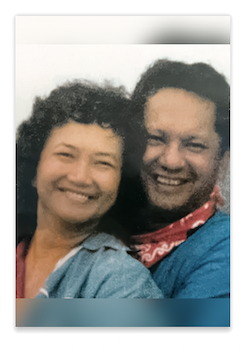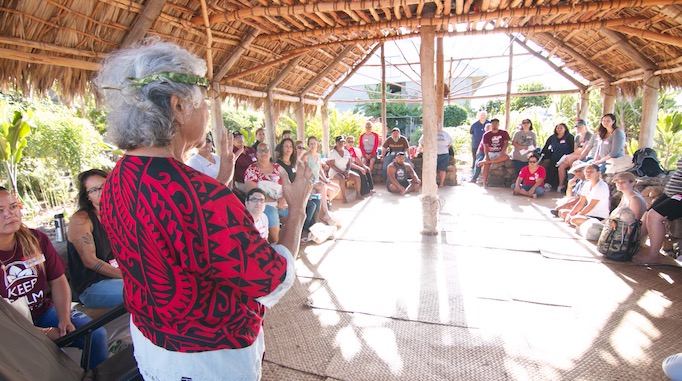
One of the highest honors in social work has been awarded to University of Hawaiʻi at Mānoa and UH West Oʻahu faculty member and community leader Lynette Kahekili Kaopuiki Paglinawan, MSW. The National Association of Social Workers Foundation recognized Paglinawan for her decades-long work to integrate the Native Hawaiian practice of hoʻoponopono (healing ritual of reconciliation and forgiveness) into social work in Hawaiʻi.
“Hoʻoponopono gives families a means to open their hearts, forgive each other, and express love, and then move forward with healthier communication,” said Paglinawan, who is faculty with the Native Hawaiian Interdisciplinary Health program, a collaboration between the UH Mānoa Thompson School of Social Work & Public Health and the John A. Burns School of Medicine Native Hawaiian Center of Excellence. She was also the director of the Thompson School’s Hawaiian Learning Program, a cultural program for MSW students who were committed to work with Native Hawaiian clients and organizations.
- Related UH News story: Native Hawaiian program continues to decolonize space, November 24, 2020

Hoʻoponopono is a way of restoring a relationship after a dispute by gathering the people involved and giving each person a chance to speak about their emotions, until all parties feel they have been acknowledged, and repentance and forgiveness have occurred.
Paglinawan often worked with her husband, Richard Kekumuikawaiokeola Paglinawan, who was also a social worker, to lead ʻohana through hoʻoponopono. Together, they brought hoʻoponopono forward into education for social workers in Hawaiʻi, and in doing so, changed the way that many families’ social work cases have been handled. Richard was also a recipient of the Social Work Pioneer award. He died in 2015.
“When we started out, it seemed that families in Hawaiʻi were experiencing hardships related to cultural trauma. They were facing Hawaiian difficulties, but had no Hawaiian solutions,” Lynette Paglinawan said.
She earned her bachelor’s degree in sociology and her master’s in social work from UH Mānoa. Her contributions in the community have earned her several recognitions, including being named a “Living Treasure of Hawaiʻi” in 2012 by the Honpa Hongwanji Mission of Hawaiʻi, and an honorary doctor of Indigenous practice in hoʻoponopono from Taiwan University in 2019.
Growing up in Honolulu
Raised in a crowded tenement at the edge of Chinatown, Paglinawan developed a deep appreciation for family togetherness and enjoying recreation in nature. She learned Hawaiian practices of gathering food from the ocean and streams, and the importance of gathering only what was needed.
…families in Hawaiʻi were experiencing hardships related to cultural trauma. They were facing Hawaiian difficulties, but had no Hawaiian solutions.
—Lynette Paglinawan
Paglinawan realized she wanted to be a social worker in high school, and was influenced by a Native Hawaiian social worker who her mother knew. Her early work led her to realize that a lack of belief in Native Hawaiian traditions was the result of cultural trauma.
“The people who colonized Hawaiʻi came here with a particular worldview. Prior to colonization, the Native Hawaiians had their own ways of solving problems,” she said. “I wondered why Native Hawaiians were not at the top of educational outcomes in Hawaiʻi.”
She tracked statistics on problems in Hawaiʻi, and although cultural trauma was not a known concept at the time, the hidden fears and pain experienced by Native Hawaiian ʻohana in their daily lives came to light. Her graduate research project tested the viability of implementing hoʻoponopono with struggling families.
“I realized many contemporary families were not familiar with this practice,” Paglinawan said. “They needed information about its purpose and intention, as well as the necessary attitudes and procedures.”
Teaching future social workers
Paglinawan is currently the Kupuna-in-Residence at UH West Oʻahu, where she teaches a course called Nohona Hawaiʻi: Living a Hawaiian Way. Class discussions focus on the values of respecting elders, sharing resources, and caring for the land and the environment. She wants her students to see the connections between their efforts in their personal relationships and their efforts to care for the Earth.
“Before you can teach others to practice hoʻoponopono, you have to go through the process yourself. Even today, I practice the process with my family,” she said. “We rely on the wisdom of our kūpuna to listen to each other and ask for forgiveness.”


